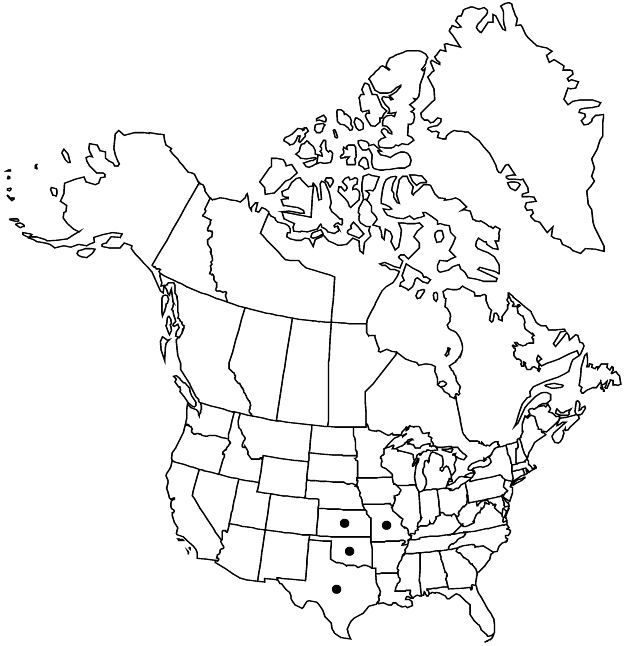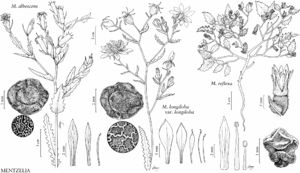Mentzelia albescens
Abh. Königl. Ges. Wiss. Göttingen 19: 150. 1874.
Plants biennial, candelabra-form. Stems solitary, erect, straight; branches distal, distal longest, antrorse, straight; hairy. Leaves: blade 31–92(–157) × 10.5–27.6(–41) mm, widest intersinus distance 5.2–23.3(–29) mm; proximal lanceolate or elliptic, margins serrate to pinnate, teeth or lobes 8–22, slightly antrorse, 1.8–6 mm; distal lanceolate, base clasping, margins usually serrate to pinnate, occasionally entire, teeth or lobes (0–)10–20, slightly antrorse, 1.4–7.6 mm; abaxial surface with simple grappling-hook, complex grappling-hook, and needlelike trichomes, adaxial surface with simple grappling-hook and needlelike trichomes. Bracts: margins entire. Flowers: petals golden yellow, 5.7–9.2 × 1.3–3 mm, apex usually acute, occasionally rounded, glabrous abaxially; stamens golden yellow, 5 outermost petaloid, filaments narrowly spatulate, slightly clawed, 4.7–8.4 × 1–2.4 mm, without anthers, second whorl with anthers; anthers straight after dehiscence, epidermis smooth; styles 3.5–5.4 mm. Capsules cylindric, 13.6–23.5 × 5.1–7.8 mm, base tapering, not or slightly longitudinally ridged. Seeds: coat anticlinal cell walls straight, papillae 4–17 per cell. 2n = 22.
Phenology: Flowering May–Nov.
Habitat: Dry grasslands, xeric habitats of arroyos, roadsides, roadcuts, washes, chat piles, slopes.
Elevation: 200–1600 m.
Distribution

Kans., Mo., Okla., Tex., South America (Argentina, Chile).
Discussion
Phylogenetic analyses (J. J. Schenk and L. Hufford 2011) recovered representative populations of Mentzelia albescens from Texas and South America in a monophyletic group. Phylogenetic placement of these populations among lineages in sect. Bartonia, as well as a lack of morphological differentiation among North American and South American populations, suggests a recent dispersal to South America. In the flora area, this species is native to central and western Texas, and introduced in Kansas, Missouri, and Oklahoma.
Selected References
None.
